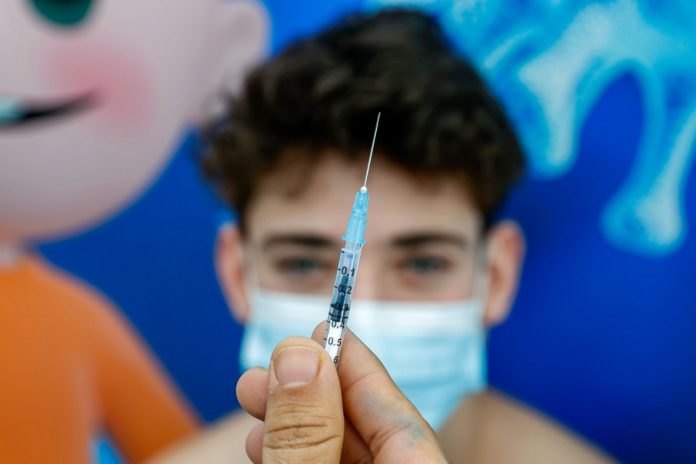Health Canada has authorized a second COVID-19 vaccine for use in older children.
The agency said Friday that it considers Moderna’s vaccine to be “safe and effective at preventing COVID-19” in children between the ages of 12 and 17.
Pfizer’s COVID-19 vaccine was approved for the same age group in May.
The Moderna vaccine has been approved for use in adults over the age of 18 by Health Canada since December 2020.
Just as in adults, the health agency said children should be given two doses of the mRNA vaccine scheduled one month apart for maximum protection against COVID-19.
According to clinical trials, the Moderna vaccine was 100 per cent effective in participants aged 12 to 17 years old two weeks after their second dose.
By comparison, Health Canada said the Moderna vaccine was 94.1 per cent effective in trial participants over the age of 18.
Although children are less likely to become really ill from COVID-19, the health agency stressed the importance of having them vaccinated because they can still get sick, be infected and not have any symptoms, spread the virus to others, and may experience long-term effects if they do contract it.
Children and youth with underlying medical conditions may also have a higher risk of severe illness from COVID-19, Health Canada said.
Health Canada data shows that as of Aug. 21, 76.9 per cent of adolescents between the age of 12 and 17 had received at least one dose of COVID-19 vaccine and 63.57 per cent were fully vaccinated with two doses.
Following Health Canada’s approval, the National Advisory Committee on Immunization (NACI) released updated recommendations on the use of mRNA vaccines in adolescents aged 12 to 17 to include the vaccine by Moderna.
In its review, NACI considered the rare cases of myocarditis (inflammation of the heart muscle) and/or pericarditis (inflammation of the tissue surrounding the heart) following immunization with mRNA COVID-19 vaccines that were reported both in Canada and internationally.
While higher rates of myocarditis and/or pericarditis adverse events were reported after the administration of the Moderna vaccine compared to the one by Pfizer-BioNtech, Canada’s Chief Public Health Officer Dr. Theresa Tam said in a statement that these events are considered rare and “verification of this potential difference is ongoing.”
“Nevertheless, some provinces and territories may decide to continue using the Pfizer-BioNTech given more experience with this vaccine product in the adolescent age group and the possibility of a lower rate of myocarditis and/or pericarditis,” she said in the statement on Friday.
Tam added that given the importance of vaccinating adolescents before the fall and the return to school, NACI’s updated recommendations will help the country with its vaccine rollout to “to better protect the health and wellbeing of adolescents, their families and communities.”
NACI is also reviewing emerging evidence on the potential benefit of an additional dose in certain populations, including those who are immunocompromised or seniors living in congregate settings, she said.
There is still no COVID-19 vaccine approved for use in children under the age of 12 in Canada. Health Canada said clinical trials are currently underway to determine the safety and effectiveness for those in this age group.
































